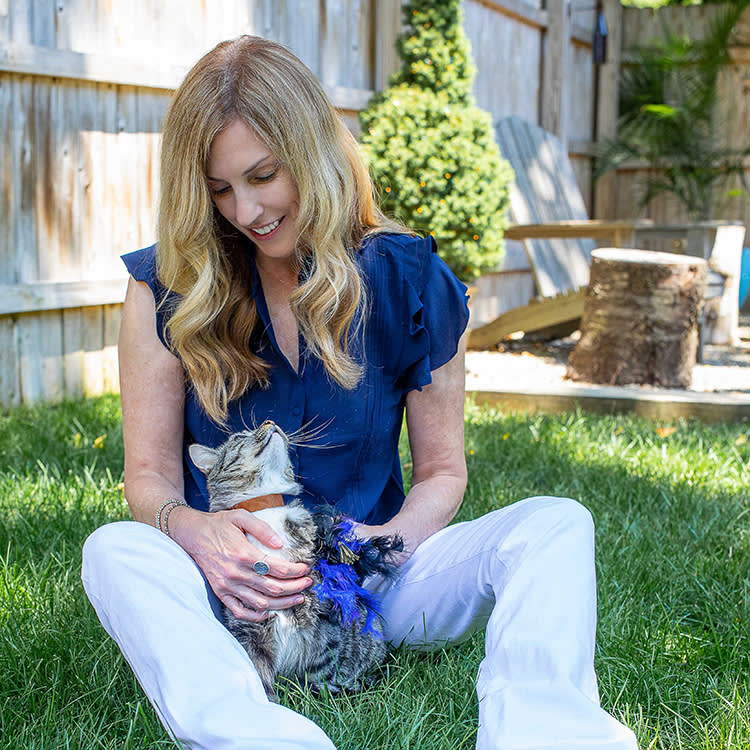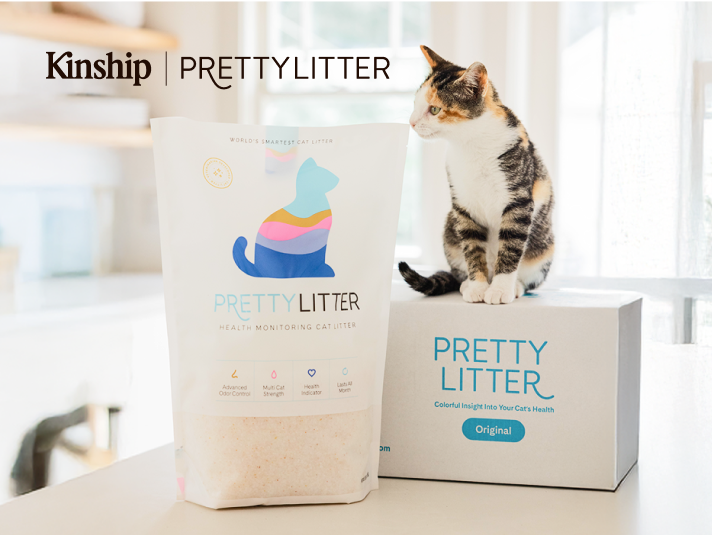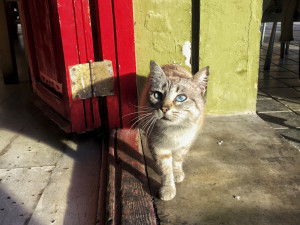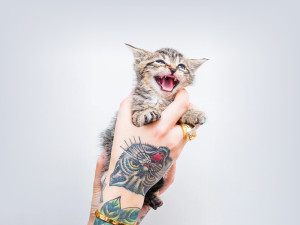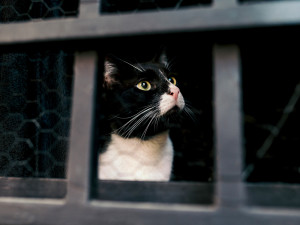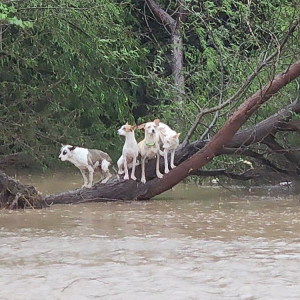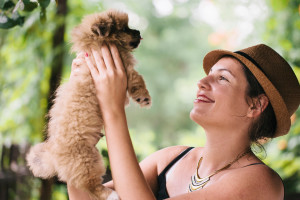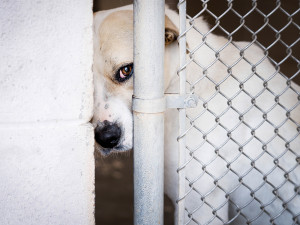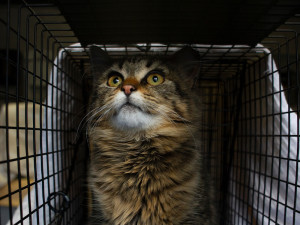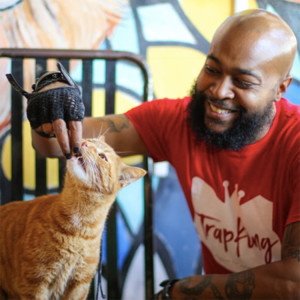Mission Meow Has a Clever (Cat-Like) Approach to Fundraising
Because rescue kitties deserve your crowdfunding cash, too.
Sally Williams is an equal opportunity animal lover, but when it came to founding her second nonprofit, she decided to shine the spotlight on small cat-focused organizations. But how best to do that?
Most charities receive funding through four channels: individual donors, grants, fundraisers, and business donors. Williams’s past experience taught her that fundraisers require upfront funds and were unpredictable. Grants for feline-focused groups were dwindling while the number of applicants were on the rise. Receiving a steady flow of individual donations was no easy task. That left business donations.
Save on the litter with color-changing tech that helps you better care for your cat.
When a house fire broke out in a nearby community, Sally noticed businesses pitching in to help the victims. If businesses worked together effectively to help a family, why not a whole cat community? She was familiar with individual crowdfunding and was convinced the same could be done with businesses. Using this innovative new approach to fundraising, Mission Meow opens in new tab was born.
While individual donations and fundraisers are still important to Mission Meow, its approach to coordination donations from 200-plus businesses annually makes it truly unique. Each month, the organization will pool funds to help a different small feline nonprofit. A donation of more than $10,000 to a local rescue or trap/neuter/rescue (TNR) group could be life-changing and allow for the purchase of a transport van, catio construction, or the creation of a neonatal unit.
How much do you spend on your pet per year?
Mission Meow officially kicks off donation efforts on October 1 with a launch event at Catsbury Parkopens in new tab in Asbury Park, New Jersey. As the first grant recipient, Catsbury Park has pledged to use the funds for their expansion. By more than doubling the size of their storefront, they will be able to create medical isolation rooms for the cats and greatly expand the adoption room.
Mission Meow was formed by a group of animal advocates looking to create an innovative way to increase charitable donations to feline-centric nonprofit organizations. Mission Meow needs business partnerships and donations to achieve its mission.
Tell me a little bit about yourself and how your love of and service to animals developed.
I love to say I was just born that way. When my mom was pregnant with me our cat, Sandy, slept on her belly, and after I was born, in the bassinet with me. Sandy was with me all the time and was the first feline love of my life. As a pre-teen, I started feeding my neighbor’s cats, and when I was eventually out on my own, I always had at least two cats of my own.
After a 25-year career in retail, I was diagnosed with a few autoimmune diseases that required me to make a career change. Although I wish illness hadn’t been the reason, it was the best thing that could have happened to me. I became a shelter volunteer, socializing cats on the days I felt good. While I was there for the cats, it was truly very healing for me. My work with the cats at the shelter inspired me to train as a cat behaviorist and animal reiki practitioner and eventually led to my becoming a nonprofit founder and director. I currently have four fabulous cats: Jonesey, West, Henry, and Jameson.
You ran a successful nonprofit, The Brodie Fund, that helped families of pets with cancer. What made you decide to switch gears and start Mission Meow?
The Brodie Fund had an incredible six and a half years of giving the gift of time to pets fighting cancer, but living in the pet cancer world is very hard. Closing The Brodie Fund was incredibly hard because it had been my passion and was very much needed, but it was also the source of tremendous sadness and eventual burnout. After some time away from the nonprofit world, my love of helping animals called me once again, and I decided to focus on something a little less emotionally draining.
How did you arrive at the decision to focus your non-profit on cats?
There are several reasons why the focus is cats, but the main one is that the cat community is underserved. There are so many incredible small feline-centric nonprofits that do amazing work with very little funding. With my background in the cat behavior and advocacy world, I knew I could use my connections to build a strong board of directors and source great business partners.
How does Mission Meow work?
Mission Meow combines a unique business donation crowdfunding formula with personal donations and merchandise sales to maximize fundraising. With this three-pronged approach, we can raise more money and make real change for our grant recipients.
What makes Mission Meow unique?
The business donations crowdfunding is truly what makes us unique. Businesses sign up as partners committing to annual donations that fit their budget. By crowdfunding from hundreds of businesses and funneling those donations into a different feline-focused nonprofit each month, we can create meaningful change for those organizations.
Our goal is to have 200 business partners each year. If we average $600 annually per business partner, we can bestow a $10,000 grant to a different feline-focused nonprofit each month. This is before even calculating personal donations and merchandise sales. And those donating — businesses and individuals alike — will know exactly how their contributions helped each organization.
How do you pick the organizations that will receive Mission Meow’s monthly grants?
After our October launch, we will be placing the application on our website. There will be criteria that each organization must meet. We are focusing on helping smaller nonprofits for whom $10,000 can make a large impact. They must outline and commit to a specific project or need.
The Mission Meow Grant Recipient Committee will vet all applicants by reviewing their proposals and conducting interviews with each nonprofit leadership team. Once selected, the organization must sign a memorandum of understanding for the grant (specifically how it will be used) with a commitment to follow up with photos of the completed project/initiative. We want all donors (individual and business) to see how the grant has impacted the benefiting nonprofit and share in the joy of a dream fulfilled.
What, in your opinion, is the biggest challenge cats face in our society today?
Wow, that’s a big question, but I would say equality. Let me preface by saying I love dogs, but cats do not get the same level of attention in our society with exception of maybe in the home, where we absolutely adore them.
Felines are the No. 1 pet in the U.S. in sheer numbers, but that is not reflected anywhere. Cats are 50 percent less likely to receive an annual wellness exam versus dogs. Cat sections at retail pet stores are smaller than those for their canine counterparts. TNR is still controversial in many places, even though it’s necessary to reduce the feral cat population. Cats often lack enrichment, which leads to health issues and obesity. These are all challenges, but all challenges that can be met, and I believe eventually will be because of the amazing cat community of which I am incredibly proud to be a part.
